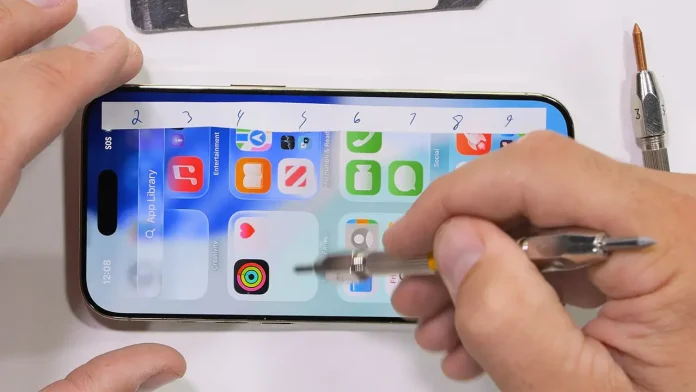iPhone Air Durability Test: Apple’s latest marvel, the iPhone Air, has faced its ultimate test at the hands of Zack Nelson, the creator of the popular YouTube channel JerryRigEverything. Known for pushing smartphones to their limits with scratches, burns, and bending challenges, Nelson put the slimmest iPhone ever at 5.6mm through his signature durability gauntlet.
Titanium Frame and Ceramic Shield 2: A Durability Dream
Apple’s bold choice to use grade 5 titanium for the iPhone Air frame combines futuristic design with real-world toughness. Nelson notes its extreme lightness, likening it to a single Oreo wafer or three wooden toothpicks. While incredibly slim and pocket-friendly, this thinness raised questions about how well it could survive everyday stress.
Titanium is not just lightweight—it’s twice as stiff as aluminum and 60% more elastic, allowing it to flex without permanent bending. Paired with Apple’s Ceramic Shield 2 glass, the iPhone Air promises a blend of durability and elegance. But as Nelson’s tests reveal, actual performance matters more than marketing claims.
Scratch Test: Ceramic Shield 2 Impresses
Nelson started with his trademark scratch test. Most smartphone glass begins to show scratches at level 6 on the Mohs hardness scale. The iPhone Air screen, however, resisted marks until level 7, leaving scratches barely visible—outperforming the Galaxy S25 Ultra’s Gorilla Armor 2, which scratched at level 6.
Even Nelson, often critical of Apple, admitted this was a game-changing display. The back glass, with its soft-touch etched finish and polished titanium frame, isn’t scratch-proof but held up surprisingly well for such a premium design.
Anti-Reflective Coating: A Rare Misstep
Not everything was flawless. Apple claims the iPhone Air display features an anti-reflective coating, but under side-by-side comparison with a two-year-old Galaxy S24 Ultra, the difference was clear. In bright light, the Samsung screen dispersed reflections perfectly, while the iPhone Air showed a noticeable white rectangle.
Despite this, the 18MP front camera and 48MP rear camera, protected by Ceramic Shield 2 and integrated into a seamless glass visor, keep the optics competitive. However, it lacks the wide-angle and telephoto lenses seen in the iPhone 17 Pro lineup.
Bend Test: Titanium’s True Strength
The moment fans had been waiting for—the bend test—proved the iPhone Air’s resilience. Nelson first applied pressure with both thumbs from behind, and the phone remained unyielding. Flipped to the front, it showed only a minor curve, but the titanium frame snapped back instantly, unlike the infamous iPhone 6 Plus, which permanently bowed under far less stress.
Nelson then attached the iPhone Air to a crane scale to measure exact force tolerance. The results were staggering: 216 pounds of force before the front glass shattered and the frame stretched beyond repair. Remarkably, the back glass stayed intact, and the device remained functional, demonstrating strong structural integrity.
Conclusion: Beauty Meets Durability
Apple’s gamble on a super-thin design seems to have paid off. The iPhone Air survives extreme stress tests while maintaining elegance, proving that durability doesn’t have to compromise style. If you’re thinking about buying this phone, the takeaway is clear: it’s both stunning and resilient, and with minimal care—or a protective case like Dbrand—it’s ready for the challenges of daily use.
Also Read: Can the Internet Shut Down Worldwide? Understanding How the Global Network Works

